中考英语专题13 简单句(原卷版)
- 格式:doc
- 大小:94.00 KB
- 文档页数:13
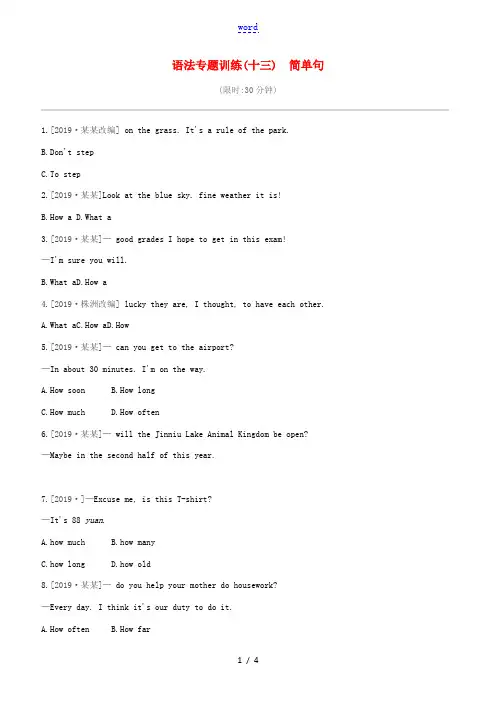
语法专题训练(十三) 简单句(限时:30分钟)1.[2019·某某改编] on the grass. It's a rule of the park.B.Don't stepC.To step2.[2019·某某]Look at the blue sky. fine weather it is!B.How a D.What a3.[2019·某某]— good grades I hope to get in this exam!—I'm sure you will.B.What aD.How a4.[2019·株洲改编] lucky they are, I thought, to have each other.A.What aC.How aD.How5.[2019·某某]— can you get to the airport?—In about 30 minutes. I'm on the way.A.How soonB.How longC.How muchD.How often6.[2019·某某]— will the Jinniu Lake Animal Kingdom be open? —Maybe in the second half of this year.7.[2019·]—Excuse me, is this T-shirt?—It's 88 yuan.A.how muchB.how manyC.how longD.how old8.[2019·某某]— do you help your mother do housework?—Every day. I think it's our duty to do it.A.How oftenB.How farC.How soonD.How much9.[2019·某某]— did you celebrate the Dragon Boat Festival this year, Tom? —By making rice dumplings with my Chinese friends.A.Where10.[2019·眉山] noise pollution, and we can live in a quiet environment.C.PreventedD.To prevent11.[2019·某某]—There is nothing left in the fridge, ?—. Let's go to the supermarket to buy some.A.is there; YesB.isn't there; YesC.is there; NoD.isn't there; No12.[2019·宿迁]— do you sleep every day, Eric?—For about eight hours.A.How muchB.How fastC.How oftenD.How long13.—Did Jeff go to the zoo by subway or by taxi yesterday?—.A.Yes, he went there by subwayB.No, he went there by busC.He went there by taxiD.He went there to see animals14.[2019·某某]— is it from your school to the bus stop?—It's about 5 minutes' walk.A.How oftenB.How longC.How soonD.How far15.—?—She is of medium height with two blue eyes.A.How is RitaB.What does Rita likeC.What does Rita look likeD.How do you like Rita16.—How often do you have a meeting one month?—.A.For one weekB.One week agoC.In one weekD.Once a week17.The structure of the sentence “The students visited the museum.” is .A.S+VB.S+V+DOC.S+V+IO+DOD.S+V+DO+OC18.Watch out, Peter! is a little boy playing ahead on the road.19.[2019·黔南州]—Steven had nothing for breakfast this morning, ? —No. Because he had a fever.A.hadn't heB.had heC.didn't heD.did he20.[2019·某某]—Last summer holiday, I didn't go anywhere. How boring! —. But I'm going somewhere for a holiday this summer.A.Neither I didB.Neither did IC.So did ID.So I did【参考答案】1.B 根据常识可知,不能践踏草坪,故本题用祈使句的否定形式“Don't+动词原形”。


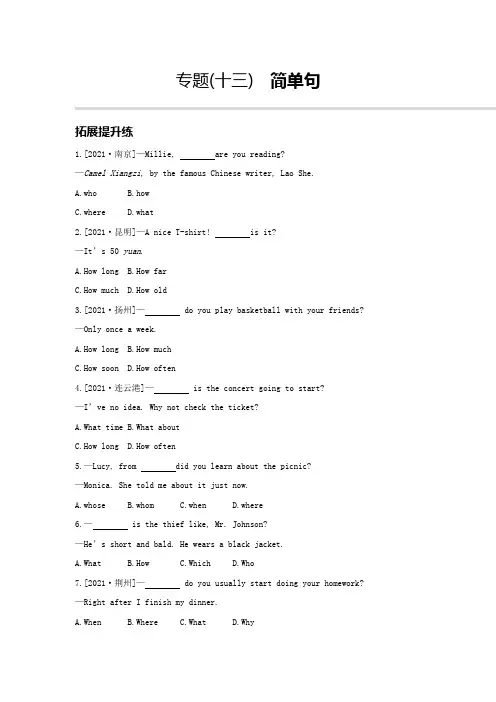
专题(十三) 简单句拓展提升练1.[2021·南京]—Millie, are you reading?—Camel Xiangzi, by the famous Chinese writer, Lao She.A.whoB.howC.whereD.what2.[2021·昆明]—A nice T-shirt! is it?—It’s 50 yuan.A.How longB.How farC.How muchD.How old3.[2021·扬州]— do you play basketball with your friends? —Only once a week.A.How longB.How muchC.How soonD.How often4.[2021·连云港]— is the concert going to start?—I’ve no idea. Why not check the ticket?A.What timeB.What aboutC.How longD.How often5.—Lucy, from did you learn about the picnic?—Monica. She told me about it just now.A.whoseB.whomC.whenD.where6.— is the thief like, Mr. Johnson?—He’s short and bald. He wears a black jacket.A.WhatB.HowC.WhichD.Who7.[2021·荆州]— do you usually start doing your homework? —Right after I finish my dinner.A.WhenB.WhereC.WhatD.Why8.[2021·绥化改编]There is plenty of information about AI(人工智能) on the website, ?A.isn’t thereB.isn’t itC.is thereD.is it9.[2021·龙东改编]—It is rude to ask direct questions, ?—Yes, but I think it’s OK to your close friends.A.isn’t itB.doesn’t itC.does itD.is it10.—He’s never been asked to work hard, ?—. His teachers always encourage him.A.is he; No, he isn’tB.has he; No, he hasn’tC.has he; Yes, he hasD.is he; Yes, he is11.[2021·云南]—Our class won the first prize in today’s basketball match. — exciting news it is! We’re all glad about it.A.WhatB.What anC.HowD.How an12.[2021·武威]—They’ve bought the sick children some toys and flowers.—So they have. nice of them!A.HowB.WhatC.How aD.What a13.[2021·遂宁]—He has made many friends since he came here three weeks ago. — outgoing boy he is!A.How aB.HowC.What aD.What an14.[2021·宿迁]— nice music lesson Mrs Wu gave us today!—Yes. We enjoyed it very much.A.WhatB.What aC.HowD.How a15.If you’re interested in our business plan, this number and ask for Ms Lee. She’ll answer your questions.A.callingB.callC.and callD.to call16.[2021·绥化改编] it over, and you will be able to work out the problem.A.ThinkingB.To thinkC.ThinkD.Thought17.[2021·梧州]— your hands before dinner, Tony.—No problem, Mom.A.WashB.WashesC.WashingD.To wash18.[2021·襄阳]— nice weather it is to go hiking! Would you like to go with me?—Good idea! Let’s go.A.How aB.HowC.What aD.What19.[2021·大连] at people when you talk. This is a polite way of communication in China.A.LookB.LookingC.To lookD.Looked20.— fast China is developing!—Yes. We are so lucky to live in such a great country!A.WhatB.What aC.HowD.How a21.[2021·郴州改编]—Could you please tell me the library is from here? —It’s about fifteen minutes’ ride.A.how soonB.how longC.how farD.how often22.[2021·滨州]— do you think we can finish the report?—Perhaps in one more hour.A.How longB.How muchC.How soonD.How often23. quiet and sit down. The teacher will tell us some important news.A.KeptB.To keepC.KeepingD.Keep24.[2021·绥化改编]Only at that time that he was wrong.A.he realizedB.did he realizeC.he did realizeD.can he realize25.[2021·恩施州改编]—I have never been to Tenglong Cave.—.A.Neither do IB.So have IC.Neither have ID.So do I26.—Is he speaking Spanish? I can hardly catch a word.—. He’s from Brazil, so I guess maybe it is Portuguese(葡萄牙语). A.So I can B.Neither can IC.Neither I canD.So can I【参考答案】拓展提升练1.D2.C 考查疑问词辨析。
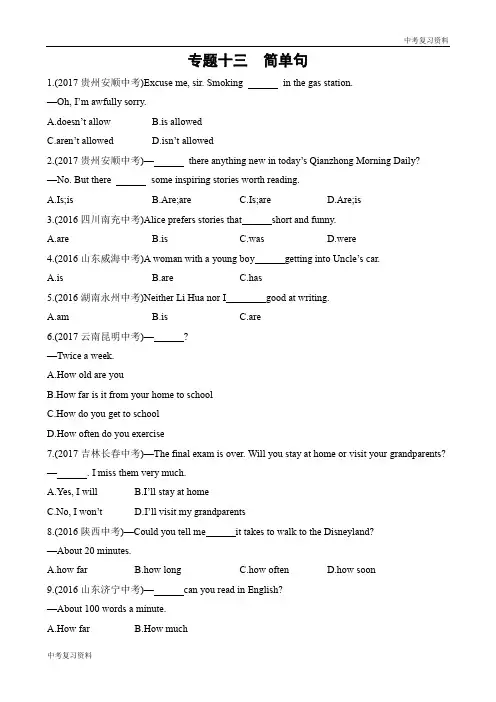
专题十三简单句1.(2017贵州安顺中考)Excuse me, sir. Smoking in the gas station.—Oh, I’m awfully sorry.A.doesn’t allowB.is allowedC.aren’t allowedD.isn’t allowed2.(2017贵州安顺中考)—there anything new in today’s Qianzhong Morning Daily? —No. But there some inspiring stories worth reading.A.Is;isB.Are;areC.Is;areD.Are;is3.(2016四川南充中考)Alice prefers stories that short and funny.A.areB.isC.wasD.were4.(2016山东威海中考)A woman with a young boy getting into Uncle’s car.A.isB.areC.has5.(2016湖南永州中考)Neither Li Hua nor I good at writing.A.amB.isC.are6.(2017云南昆明中考)—?—Twice a week.A.How old are youB.How far is it from your home to schoolC.How do you get to schoolD.How often do you exercise7.(2017吉林长春中考)—The final exam is over. Will you stay at home or visit your grandparents? —. I miss them very much.A.Yes, I willB.I’ll stay at homeC.No, I won’tD.I’ll visit my grandparents8.(2016陕西中考)—Could you tell me it takes to walk to the Disneyland?—About 20 minutes.A.how farB.how longC.how oftenD.how soon9.(2016山东济宁中考)—can you read in English?—About 100 words a minute.A.How farB.How muchC.How fastD.How many10.(2016宁夏中考)—Could you tell me you will come back?—In ten minutes.A.how soonB.how oftenC.how longD.how fast11.(2016天津中考)—I tried to pass the driving test, but I failed.—. Good luck to you next time.A.That’s greatB.It’s interestingC.That’s a pityD.Glad to hear that12.(2015广东中考)—there any living things on other planets?—I have no idea.Maybe we can know more about that in the future.A.IsB.AreC.HasD.Have13.(2015黑龙江哈尔滨中考)Doing eye exercises one of the useful ways to protect our eyes.A.isB.areC.were14.(2015内蒙古呼和浩特中考)Neither the headmaster nor the teachers take a vacation next week.A.were going toB.is going toC.was going toD.are going to15.(2015江苏镇江中考)—Hi,I didn’t see you at the party in the company yesterday evening. —Oh,all my family my son’s birthday at home.A.celebratedB.have celebratedC.was celebratingD.were celebrating16.(2015上海中考)—father took part in the charity activity in the neighbourhood yesterday?—Peter’s.A.WhoseB.WhatC.WhichD.Who17.(2015江苏连云港中考)—What programme is so attractive?—The guard of honor(仪仗队)of the PLA are taking part in the parade on Red Square.—exciting event!A.How aB.What anC.How anD.What a18.(2015重庆中考)—did you work out the problem in such a short time?—With Mr.Li’s help.A.WhenB.WhereC.HowD.Which19.(2017湖北黄冈中考)—I missed the match between Ma Long and Fan Zhendong last night. , May?—Amazing! It’s the most exciting match of the world table tennis.A.Can I help youB.Could you help meC.What’s it aboutD.What’s it like20.(2017内蒙古包头中考)—I will go to Hong Kong Disneyland with my parents tomorrow.—!A.My pleasureB.Enjoy yourselfC.All rightD.The same to you21.(2017广西南宁中考)—Sorry for being late.—A.That’s true.B.Here you are.C.Never mind.D.Certainly.22.(2016吉林中考)—Do you know some robots are able to serve as waiters in restaurants? —Really?interesting it is!A.WhatB.What aC.How23.(2016湖北襄阳中考)—, or we’ll be late for the meeting.—It’s only half past one by my watch. We have enough time left.A.Hurry upB.Don’t worryC.Never mindD.Be quiet24.(2015安徽中考)—is your father?Does he still work as an engineer?—Yes,he has been an engineer for thirty years.A.WhoB.HowC.WhatD.Which25.(2015广东中考)—So far,Su Bingtian is the only Chinese who finished the 100-meter race in less than 10 seconds.—he runs!A.How slowB.How fastC.What a slowD.What a fast26.(2015山东临沂中考)—people travel every year?—Perhaps when we are talking about it,more than 100 planes have taken off around the world.A.How manyB.How muchC.How longD.How often27.(2015贵州遵义中考)A:did you come so late to your office this morning?B:Oh,I felt so sick that I couldn’t get up on time.A.HowB.WhichC.Why28.(2015宁夏中考)Do you think a meeting tomorrow afternoon?A.is thereB.there isC.there wasD.there is going to be29.(2015宁夏中考)exciting news it is!A.WhatB.What anC.HowD.How an答案精解精析1.答案D句意:——对不起,先生。
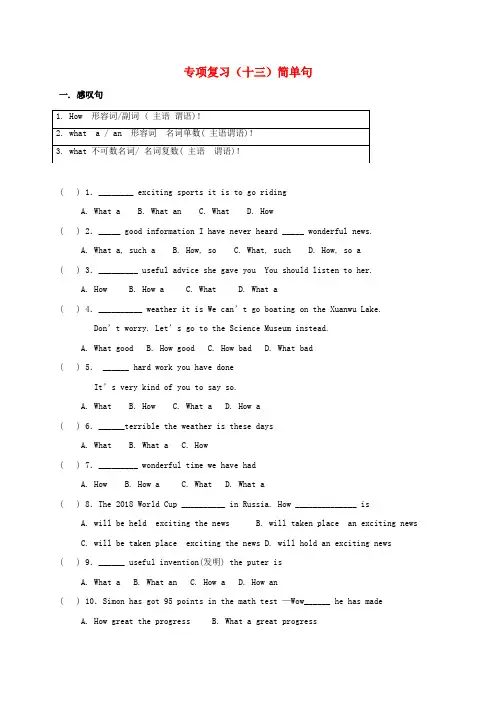
专项复习(十三)简单句一. 感叹句( ) 1.________ exciting sports it is to go ridingA. What aB. What anC. WhatD. How( ) 2._____ good information I have never heard _____ wonderful news.A. What a, such aB. How, soC. What, suchD. How, so a( ) 3._________ useful advice she gave you You should listen to her.A. HowB. How aC. WhatD. What a( ) 4.__________ weather it is We can’t go boating on the Xuanwu Lake.Don’t worry. Let’s go to the Science Museum instead.A. What goodB. How goodC. How badD. What bad( ) 5. ______ hard work you have doneIt’s very kind of you to say so.A. WhatB. HowC. What aD. How a( ) 6.______terrible the weather is these daysA. WhatB. What aC. How( ) 7._________ wonderful time we have hadA. HowB. How aC. WhatD. What a( ) 8.The 2018 World Cup __________ in Russia. How ______________ isA. will be held exciting the newsB. will taken place an exciting newsC. will be taken place exciting the newsD. will hold an exciting news( ) 9.______ useful invention(发明) the puter isA. What aB. What anC. How aD. How an( ) 10.Simon has got 95 points in the math test —Wow______ he has madeA. How great the progressB. What a great progressC. How great progressD. What great progress( ) 11.—Have you heard of the songs sung by the first lady Peng Liyuan?—Of course __________ beautiful voice she hasA. WhatB. What a C .How D. How a( ) 12.—Line 3 of the Nanjing Metro will be in use in 2014.—Wow,________A. how excited the news isB. what an excited newsC. how exciting newsD. what exciting news13. It is raining heavily. (变为感叹句) ______ _____ it is raining14. This is a very interesting movie.____ ____ _____ book it is ____ ______ the book is15. It was sunny yesterday.____ _____ weather it was yesterday _____ _____ the weather _____ yesterday二. 祈使句:以动词原形开头。
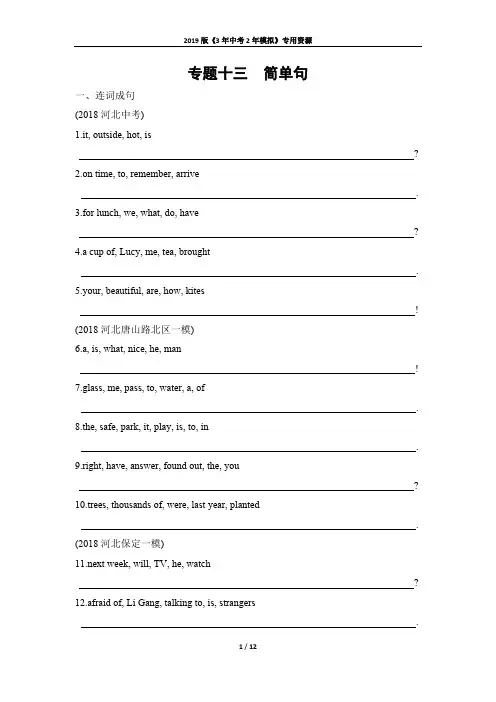
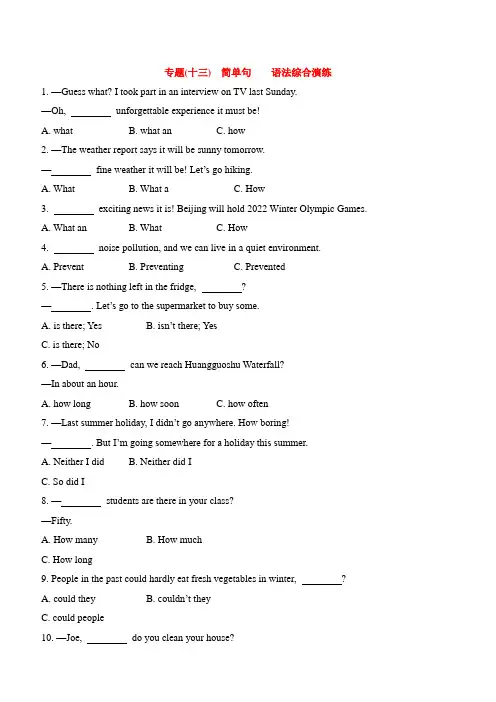
专题(十三)简单句语法综合演练1. —Guess what? I took part in an interview on TV last Sunday.—Oh, unforgettable experience it must be!A. whatB. what anC. how2. —The weather report says it will be sunny tomorrow.—fine weather it will be! Let’s go hiking.A. WhatB. What aC. How3.exciting news it is! Beijing will hold 2022 Winter Olympic Games.A. What anB. WhatC. How4.noise pollution, and we can live in a quiet environment.A. PreventB. PreventingC. Prevented5.—There is nothing left in the fridge, ?—. Let’s go to the supermarket to buy some.A. is there; YesB. isn’t there; YesC. is there; No6.—Dad, can we reach Huangguoshu Waterfall?—In about an hour.A. how longB. how soonC. how often7.—Last summer holiday, I didn’t go anywhere. How boring!—. But I’m going somewhere for a holiday this summer.A. Neither I didB. Neither did IC. So did I8. —students are there in your class?—Fifty.A. How manyB. How muchC. How long9. People in the past could hardly eat fresh vegetables in winter, ?A. could theyB. couldn’t theyC. could people10. —Joe, do you clean your house?—Three times a week.A. how longB. how muchC. how often11. —Hi, Lucy. is your birthday?—My birthday is on May 2nd.A. WhatB. WhyC. When12. everyone with politeness even those who are very rude to you, not because they are nice, but because you are.A. TreatB. TreatingC. Treated13. Please the rubbish into different litter bins according to the signs.A. putsB. putC. putting14. —Jane won the first prize in English speech contest.—big progress she has made! She used to be weak in English.A. the; HowB. the; WhatC. a; What15. —All of my classmates have passed the PE test.—exciting the news is!A. HowB. WhatC. What an16. John had a short walk after lunch, ?A. did heB. didn’t heC. hadn’t he17. Don’t make so much noise, ?A. do youB. don’t youC. will you18. —Did you enjoy the party last night?—Very much. wonderful the party was!A. WhatB. HowC. What a19.—It is said that 5G is coming. It will improve our life greatly.—amazing it is!A. What anB. How aC. How20. —did you celebrate the Dragon Boat Festival this year, Tom?—By making rice dumplings with my Chinese friends.A. WhereB. WhenC. How21. —He didn’t go to school, did he?—, though he had a stomachache.A. No, he didn’tB. Yes, he didn’tC. Yes, he did22.on the grass. It’s a rule of the park.A. StepB. Don’t stepC. To step23. —sport will you take part in, Peter?—The boys’ 800-meter race.A. WhereB. WhenC. Which【参考答案】1. B2. A3. B考查感叹句。
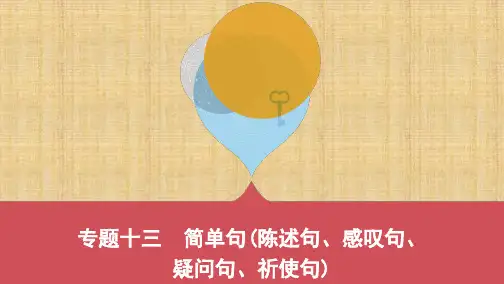
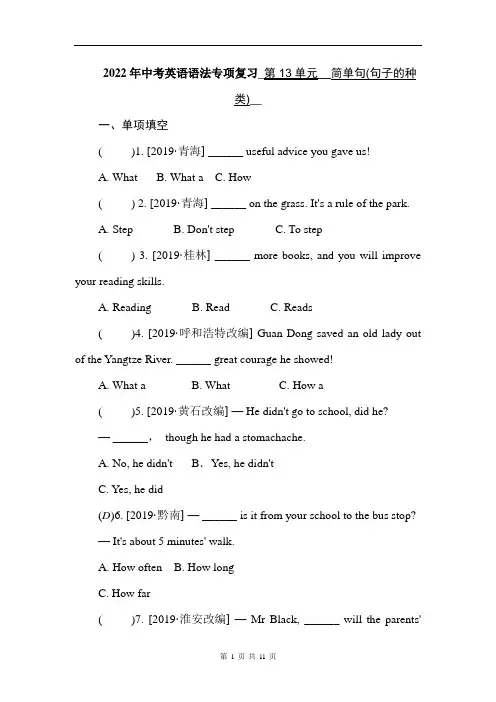
2022年中考英语语法专项复习_第13单元__简单句(句子的种类)__一、单项填空( )1. [2019·青海] ______ useful advice you gave us!A. WhatB. What aC. How( ) 2. [2019·青海] ______ on the grass. It's a rule of the park.A. StepB. Don't stepC. To step( ) 3. [2019·桂林] ______ more books, and you will improve your reading skills.A. ReadingB. ReadC. Reads( )4. [2019·呼和浩特改编] Guan Dong saved an old lady out of the Yangtze River. ______ great courage he showed!A. What aB. WhatC. How a( )5. [2019·黄石改编]— He didn't go to school, did he?— ______,though he had a stomachache.A. No, he didn't B.Yes, he didn'tC. Yes, he did(D)6. [2019·黔南]— ______ is it from your school to the bus stop?— It's about 5 minutes' walk.A. How oftenB. How longC. How far( )7. [2019·淮安改编]—Mr Black, ______ will the parents'meeting last?— It's hard to say. Maybe one hour or more.A. how longB. how muchC. how far( )8. [2019·广元] ______ fine weather it is!A. What aB. HowC. What( )9. [2019·邵阳]— ______ different life is today!— Yeah. We are all living a happy and rich life now.A. What aB. HowC. What( )10. [2019·淮安改编]— It is said that 5G is coming. It will improve our life greatly.— ______ amazing it is!A. What anB. How aC. How( )11. [2018·淮安改编]—My sister is planning to have a second child next year.— ______ good idea it is!A. WhatB. What aC. How( )12. [2018·贵阳]—______ fast Guizhou Province is developing!— Yes. It hosts the Big Data Expo every year.A. WhatB. HowC. What a( )13. [2018·成都]— Sally, I heard you're going to America.______ will you stay there?— Two whole years.A. How soonB. How oftenC. How long( )14. [2017·长沙] ______ carefully, please! Look at the road sign. There is a school ahead.A. DriveB. To driveC. Driving( )15. [2017·永州]David, ______ make trouble at school.A. can'tB. don'tC. doesn't( )16. [2016·永州]David never fights with his classmates, ______?A. does heB. doesn't heC. isn't he( )17. [2016·攀枝花改编]— I think you are different now.— Of course, times have changed and ______.A. so have IB. so I haveC. neither have I( )18. [2018·永州]— ______!— Yeah, I love her so much.A. How lovely Peggy isB. What lovely Peggy isC. How lovely is Peggy( )19. [2018·黔南改编]Life is like a journey. ______ ahead,and you will see a lot more beautiful sceneries (风景).A. PlanB. To planC. Planning( )20. [2018·安顺改编]— ______ fresh air it is now!— Yes. ______ go out for a walk.A. How; LetB. What a; Let'sC. What; Let's( )21. [2018·十堰改编]—I watched the live(直播) NBA game last night. How about you?— Of course I did. ______ amazing game it was!A. What anB. How anC. What( )22. [2018·随州改编]— ______ sweet the flowers smell in spring!— Yes, many tourists come to enjoy them every day.A. WhatB. HowC. What a( )23. [2018·宜昌改编]—It is reported that a kind of new smart phones can test the air quality (质量) around you.— ______ fast the technology develops!A. WhatB. What aC. How( )24. [2018·资阳改编]— Have you seen the movie Amazing China?— Yes. ______ an exciting one!A. WhatB. HowC. When( )25. [2018·滨州改编]—______ convenient it is to live in China!— Yes, we've got WeChat, shared bikes, Alipay, etc.A. What aB. WhatC. How( )26. [2018·遂宁改编] ______ interesting person our English teacher is!A. HowB. WhatC. What an( )27. [2018·黔南改编]—______ do your parents come to visit you in the US, Tim?— Once a year.A. How oftenB. How longC. How soon( )28. [2018·黔南改编] He has few friends in his new school, ______?A. hasn't heB. does heC. is he( )29. [2018·安顺改编]— There is little money for Mr. Lee to buy a ticket for today's show, ______?— Exactly!A. are thereB. isn't thereC. is there( )30. [2018·自贡]— ______ does she live?— She lives in the same neighborhood as me.A. WhatB. WhereC. Which二、根据汉语意思完成句子1. [2019·烟台]坚持你的梦想,将来有一天,它可能会实现。
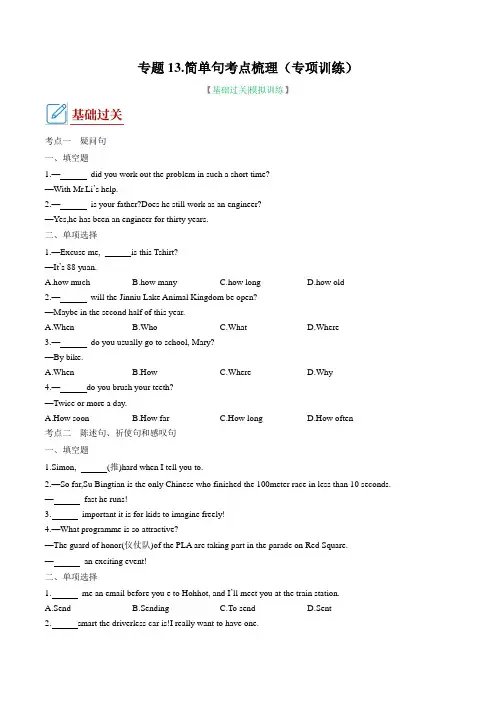
专题13.简单句考点梳理(专项训练)【基础过关|模拟训练】考点一疑问句一、填空题1.—did you work out the problem in such a short time?—With Mr.Li’s help.2.—is your father?Does he still work as an engineer?—Yes,he has been an engineer for thirty years.二、单项选择1.—Excuse me, is this Tshirt?—It’s 88 yuan.A.how muchB.how manyC.how longD.how old2.—will the Jinniu Lake Animal Kingdom be open?—Maybe in the second half of this year.A.WhenB.WhoC.WhatD.Where3.—do you usually go to school, Mary?—By bike.A.WhenB.HowC.WhereD.Why4.—do you brush your teeth?—Twice or more a day.A.How soonB.How farC.How longD.How often考点二陈述句、祈使句和感叹句一、填空题1.Simon, (推)hard when I tell you to.2.—So far,Su Bingtian is the only Chinese who finished the 100meter race in less than 10 seconds. —fast he runs!3.important it is for kids to imagine freely!4.—What programme is so attractive?—The guard of honor(仪仗队)of the PLA are taking part in the parade on Red Square.—an exciting event!二、单项选择1.me an email before you e to Hohhot, and I’ll meet you at the train station.A.SendB.SendingC.To sendD.Sent2.smart the driverless car is!I really want to have one.A.WhatB.What aC.What anD.How3.special classes we had! We have learned a lot about paper cutting.A.WhatB.What aC.How aD.How4.everyone with politeness even those who are very rude to you, not because they are nice, but because you are.A.TreatB.TreatingC.TreatedD.To treat【模拟训练】Ⅰ.填空题1.(2022广东广州改编)The school Science Day was wonderful. happy Kate’s group was!2.(2020金华、丽水,67)“interesting it is! This is simply fantastic!” he cried excitedly.3.(2019衢州,69)Just before the lights turned dark, I saw my father rush into the hall and take the seat beside my mother. a pleasant surprise it was!4.(2022宁波余姚一模)In fact, many people around the world love these black and white animals. cute and lovely they are!5.(2022湖州南浔一模)“Wow! beautiful it is!” we screamed.6.(2020宁波镇海模拟)One day a young man came to visit him and asked politely,“Please sir, are great people like you dressed in such a way?”Ⅱ.选择题1.(2022重庆) a fresh spring morning it is!A.WhoB.WhyC.WhatD.How2.(2022黑龙江哈尔滨改编)—have you been in Beijing?—For two weeks. And I went to the Great Wall.A.How soonB.How longC.How oftenD.How far3.(2022温州龙港二模)—will the Whites return from France?—In a week I think. They’ll have an important meeting next week.A.How longB.How soonC.How fastD.How often4.(2021温州瓯海一模)—can we learn from this subject, scientific knowledge or mon sense?—Both, and you will get lots of useful knowledge after finishing this course.A.WhyB.WhenC.WhatD.How5.(2021温州一模)—information you bring me!Thanks a lot!—My pleasure!A.How greatB.How a greatC.What greatD.What a great6.(2021温州模拟)—will you stay at this hotel, Mary?—For about two days. I will have a meeting here.A.How soonB.How longC.How farD.How often二1.(2019杭州江干一模,53)She said the program was designed for some of the brighter teenagers to experience a different culture. a good chance!2.(2018金华模拟,64)What are you doing? That s a new car and that window you broke is going to cost a lot of money. did you do it?3.(2018 绍兴柯桥模拟,58)(别)forget to keep the children away from fire.4.(2018嘉兴秀洲模拟,48)do we need to save? It s preparing for a rainy day. You never know what will happen in your life.二、单项选择1.(2019温州一模,8)beautiful watch you’ve got! I want one like yours, too!A.WhatB.HowC.What aD.How a2.(2019温州二中一模,21)—do you read books on school nights?—Only 20 minutes. I have too much homework to do.A.How manyB.How muchC.How oftenD.How long3.(2018温州模拟五,9)—Aamir Khan played so well in the movie Dangal.—he is! We were deeply moved while watching it.A.How seriousB.How strangeC.What a handsome actorD.What a wonderful actor4.(2018温州模拟二,10)—It’s raining again. We can’t have a picnic today.—!A.What a shameB.How luckyC.What a surpriseD.How wonderful5.(2018温州模拟三,7)—Kevin, will Mr. Green e back?—At about eleven o’clock. You can drink a cup of tea first.A.whereB.whenC.howD.why。
专题十三简单句(限时:25 分钟分值:38 分得分:_______)1.(2017 郴州)—_______ friendly boy he is!—Yes. He’s always ready to help others.A. What aB. WhatC. How2.(2017 绥化)—Your father went to the park yesterday, _______?—Yes, he did.A. didn’t heB. doesn’t heC. did he3. (2017 上海改编)—Do you know _______ a 5-day trip to Hong Kong costs?—I guess it’s about ¥4, 000.A. how fastB. how longC. how much4. (2017 连云港改编)—_______ do the students in your school do outdoor activities every day?—At least an hour.A. How oftenB. How longC. How much5.(2017 泰安改编)—_______ exciting the speech about “Belt and Road” was!—Of course! It was a really great inspiration to the world.A. HowB. WhatC. How a6.(2017 南京改编)—Millie, _______ do you take the course in DIY?—Every Saturday afternoon.第1页共11页A. how longB. how farC. how often7.(2017 随州改编)—Is the mobile phone new or old?—________. I bought it only two days ago.A. It’s oldB. It’s newC. Yes, it is8.(2017 重庆 B 卷改编)________ bad day! It’s raining hard. We have to stay at home.A. How aB. What aC. How9.(2017 宿迁改编)— I don’t like horror films. They’re terrible.—________.B. Neither I doA. Either I do C. Neither do I10.(2017 白银改编)Boys and girls, _______ learning and have fun!A. keepB. to keepC. keeping11. (2017 资阳改编)—Mom, can I go dancing this evening?— ______ your homework first, and then we’ll talk about it.A. FinishB. FinishingC. To finish12.(2017 天水改编)—Don’t you go to school by bike?—_______. I walk to school every day.A. Yes, I don’tB. No, I doC. No, I don’t13.(2017 长沙模拟)________ carefully, Michael! There’s a school ahead.A. DriveB. To driveC. Driving14. (2017 岳阳模拟)—________ is your father, Mike?第2页共11页—He is cooking in the kitchen.A. WhoB. WhatC. Where15.(2017 长沙南雅中学模拟)________ useful dictionaries they are! They are very helpful for English study.A. HowB. What aC. What16. (2017 长沙模拟)—Zhang Lei got the first place in the mid-term exam.—_______ hard-working boy!A. What aB. WhatC. How17. (2017 益阳模拟)He can hardly stay awake because he is so tired, _______?A. does heB. Isn’t heC. can he18.(2017 邵阳模拟)—I will go fishing this weekend.—_______. Let’s go together.A. So I willB. So will IC. So I am19. (2017 岳阳模拟)—_______ girls are there in your class?—Thirty.A. How muchB. How manyC. How long20.(2018 原创)—_______ Tom like playing football?—Yes, he does. He plays it every day.A. DoB. DoesC. Is21.(2018 原创)—_______ Joe has got the air ticket to London.第3页共11页—Please tell me he’s going. I’d like to see him off.A. whenB. whyC. how22. (2018 原创) ________ interesting experience! I wish I went there with you!A. WhatB. What anC. How23.(2018 原创)—_______ do you prefer, the red one or the blue one?—Neither. I like white best.A. WhatB. WhenC. Which24.(2018 原创)David, ______ talk on the mobile phone while you’re driving. It’s very dangerous.A. can’tB. don’tC. won’t25.(2018 预测)—Can you ride a bike?—______. I learned it three years ago.A. Yes, I canB. No, I can’tC. Yes, I do26.(2018 预测)—______ is your father?—He’s an engineer in a big factory.A. WhoB. WhatC. Which27.(2018 预测)— _______ did you work out the problem in such a short time?—With Mr. Li’s help.A. WhenB. WhereC. How28.(2018 预测)_______ useful advice you gave me about learning English!第4页共11页A. HowB. WhatC. What a29.(2018 预测)—Don’t be late for school next time, ________?—No, I won’t.A. are youB. will youC. do you30. (2018 预测)— _______ can you finish your homework?—In about one and a half hours.A. How fastB. How soonC. How often31.(2018 预测)________ kind and helpful to the people around us, and we will make the world a nicer place to live in.A. BeB. BeingC. To be32. 今天天气真冷啊!_____________________________________________________________________ 33. 朱婷真是个有天赋的球员啊!_____________________________________________________________________ 34. 记着把你的作业带上。
专题十三简单句1. (2017武汉)—Do you think I could borrow your pencil?—________.A. Yes, you may borrowB. Yes, you couldC. Yes, go onD. Yes, help yourself2. (2017梧州)—Most of us have all worked very hard over the last three years. —Yes. ________ unusual journey we have!A. HowB. WhatC. How anD. What an3. (2017西宁)—________ excellent work you have done!—It's very kind of you to say so.A. WhatB. HowC. What anD. How an4. (2017广东)—Is there any outdoor learning in your school?—________. We learn outdoors once or twice every month.A. Yes, there isB. No, there isn’tC. Yes, it isD. No, it isn’t5. (2017黔南)There ________ an NBA match on TV this weekend.A. will playB. is going to beC. will haveD. is going to have6. (2017黔南)—Summy ate nothing for breakfast this morning, ________?—No, because she had a stomachache.A. isn’t sheB. was sheC. didn’t sheD. did she7. (2017宜昌)—People choose highspeed train or selfdriving to travel onholidays.—________ fast the traditional travel ways change!A. What aB. HowC. WhatD. How a8. (2017孝感)—________ will you ask for help when you are in trouble?—My parents. I think.A. WhoB. WhatC. WhereD. When9. (2017毕节)—________ have you felt like this?—Three days.A. How longB. How oftenC. How muchD. How many10. (2017六盘水)—________ is it from Liupanshui to Guiyang?—It's about 300 kilometers.A. How muchB. How manyC. How soonD. How far11. (2017武威)Boys and girls, ________ learning and have fun!A. keepB. to keepC. keepingD. kept12. (2017武威)There ________ a basketball game between these two grades in the gym this afternoon.A. willB. is going to haveC. is going to beD. will have13. (2017贵阳改编)—I've never been to Disneyland, Judy.—________A. So have I.B. Neither am I.C. Neither have I.D. So I have.14. (2017青海改编)There ________ a volleyball game between China and Brazil on TV this evening.A. isB. wasC. will beD. will have15. (2017青海改编)—I wonder ________ you can finish the task.—In two weeks.A. how soonB. how longC. how oftenD. how much16. (2017昆明盘龙区二模)—People in Kunming can travel to many places on a highspee d train now.—________ good news it is!A. HowB. What anC. WhatD. What a17. (2017昆明盘龙区二模)—Is there a pencil and two books in the backpack?—________. I find nothing in it.A. No, there isn’tB. Yes, there isC. No, it isn’tD. No, there aren’t18. (2017昆明官渡区一模)—I really miss my home.—As the saying goes, “There ________ no place like home.”A. beB. amC. isD. are19. (2017昆明盘龙区二模)—________?—I'm going to study math hard.A. What are you going to beB. When are you going to startC. Are you going to be an engineerD. How are you going to do that20. (2017昆明盘龙区一模)—________ day it is!—Let’s go out and enjoy the sunshine!A. What a lovelyB. How windyC. What a rainyD. How wet21. (2017昆明五华区二模)The robot can help me sweep the floor. ________ smart invention it is!A. What aB. What anC. WhatD. How22. (2017大理统考)—Don't be late for school again, ________?—Sorry, I won't.A. are youB. will youC. do youD. did you23. (2017曲靖麒麟区二模)—What ________ the number of the students in your school?—About two thousand. A number of them ________ from the countryside.A. is; areB. is; isC. are; isD. are; are24. (2017昭通昭阳区二模)If you don't want to go cycling around the lake, ________.A. so do IB. so will IC. neither do ID. neither will I25. (2017曲靖陆良模拟)—Kunming is a really comfortable city to live in.—________. The weather is pleasant.A. So it isB. So is itC. So it doesD. So does it26. (2017大理模拟)—Excuse me. Are those Mary's books?— ________. They are hers.A. Yes, they areB. No, they aren’tC. Yes, they doD. No, they don’t27. (2017昆明三中模拟)—Do you like Chinese?—________A. I like it.B. Yes, I don’t like it.C. No, I like it.D. Yes, I like it.28. (2018原创) ________ important suggestion you gave me yesterday. I solved the problem successfully.A. What anB. What aC. How aD. How29. (2018原创)Both Li Lei and Han Meimei ________ fond of the TV program A Bite of China.A. isB. amC. wasD. are30. (2018原创)Dr. Smith, together with his wife and daughters, ________ visit Beijing this summer.A. is going toB. are going toC. was going toD. were going to31. (2018原创)There ________ any water in the glass. Let's go and get some.A. isn’tB. isC. aren’tD. are32. (2018原创) ________ dangerous it is to ride on a busy road!A. WhatB. What aC. HowD. How a33. (2018预测)—Let's take a walk after supper, ________?—Good idea!A. shall weB. will youC. will weD. are you34. (2018预测)—________ is your new English teacher?—The woman in red dress over there.A. WhoB. WhyC. WhatD. When35. (2018预测)Taking pictures ________ very interesting. I often go to the park to take photos in my spare time.A. isB. areC. to beD. be36. (2018预测)—________ bad weather it is! We can't go boating on the Cuihu Park.—Don’t worry. Let’s go to the Science M useum instead.A. What anB. HowC. How aD. What37. (2018预测)The opinions of experts ________ that three hours of outdoor exercise a week ________good for one's health.A. show; areB. shows; isC. show; isD. shows; are38. (2018预测)—What are you going to do this weekend?—My classmates as well as our teacher ________ going to climb Mount Tai.A. isB. areC. amD. were39. (2018预测)There are few students in the park, ________?A. are thereB. are theyC. aren’t thereD. aren’t they40. (2018预测)—There ________ a lot of meat on the plate. Would you like some?—Just a little, please.A. isB. areC. amD. be41. (2018预测)—Please bring your homework to school tomorrow, Steven.—OK, I ________.A. willB. won’tC. doD. don’t42. (2018预测)________ hard and you'll succeed sooner or later.A. StudyB. To studyC. StudyingD. Studied43. (2018预测)—________ does those books cost you?—About 20 dollars.A. How longB. How soonC. How oftenD. How much44. (2018预测)—I didn’t go swimming yesterdayafternoon.—________. I had to clean up my bedroom.A. So did IB. Neither did IC. Neither I didD. So I did45. (2018预测)Growing up is not easy, so ________ calm when you're facing trouble in life.A. keepB. to keepC. keepingD. kept46. (2018预测)—________ does he take this medicine?—Twice a day.A. How soonB. How longC. How muchD. How often47. (2018预测)—I like history very much.—________ It’s my favorite subject in school.A. So do I.B. So I do.C. Neither do I.D. Neither I do.48. (2018预测)—Mum, ________ no milk and eggs in the fridge.—Oh, I’ll go and buy some later.A. it isB. there isC. there areD. they are49. (2018预测)There ________ a pencilbox, two books and some flowers on the desk.A. isB. areC. hasD. have1. B【解析】考查一般疑问句的答语。
专题13 简单句本章节内容 1. 简单句的六种基本句型2.疑问句3.陈述句、感叹句、祈使句4.倒装句一、简单句的六种基本句型1.主语+系动词+表语此句型中的谓语动词为连系动词,作表语成分的有形容词、名词、代词、分词、不定式、介词短语等。
常见的系动词有be动词(am/is/are/was/were)、感官系动词(look/sound/smell/taste/feel)、“变得类”(get/become/turn)等。
Mr. Zheng .郑老师善良、有耐心。
The story . 那个故事听起来很有趣。
The weather in spring.在春天,天气变得更暖和了。
2.主语+不及物动词在此句型中,谓语动词是不及物动词,表达的意思已经很完整,所以不需要跟宾语。
有时为了表示动作发生的频率、程度、原因、结果、目的、场所、时间等,可以带状语来修饰动词。
Tom .汤姆安全地到达了。
Time .时光飞逝。
The sun . 太阳从东方升起。
3.主语+及物动词+宾语该句型中的谓语动词是及物动词,其后必须跟宾语才能使句意表达完整、准确。
宾语可以由名词、代词或相当于名词的词或短语充当,如doing、to do等形式。
Tom safely.汤姆安全地到达了机场。
They very much last night. 他们昨天晚上玩得很开心。
He a computer.他决定买一台电脑。
注意:当不及物动词与介词连用时,其后也可跟宾语。
如:Tom arrived at the airport safely.汤姆安全地到达了机场。
Ann is waiting for Kate at the school gate.安正在校门口等凯特。
4.主语+及物动词+间接宾语+直接宾语英语中有些及物动词能跟双宾语,即间接宾语(指人)和直接宾语(指物)。
通常情况下间接宾语在前,直接宾语在后。
能跟双宾语的动词常见的有:ask, bring, take, buy, cost, fetch, give, pass, lend, offer, read, send, show, teach, tell, write, make, get等。
有时也可把间接宾语置于直接宾语后,此时间接宾语前需加介词for或to。
Could ? (=Could you pass the salt to me?) 请你把盐递给我好吗?I .(=I showed my pictures to him.) 我给他看了我的照片。
He .(=He made a birthday card for his mother.) 他为他的妈妈制作了一张生日卡片。
注意:间接宾语后置与介词for连用的常见动词有buy(买), make(制作), get(去取来), choose(选择)等。
5.主语+及物动词+宾语+宾语补足语英语中,有些及物动词除能跟宾语外,有时还需加一个补足语,句意才完整。
宾语补足语的作用是说明宾语的动作或状态。
作宾语补足语的主要是名词、形容词、动词不定式和分词,副词和介词短语等也可以用作宾语补足语。
We can .我们可以叫詹姆斯吉姆。
The news . 这个消息使他很不愉快。
She asked me again. 她让我再给他打个电话。
Jenny many donuts.珍妮看到布赖恩买了许多面包圈。
I will not .我不会让你进去的。
注意:(1)后跟形容词作宾语补足语的动词有keep, make, find, get, think等。
(2)动词不定式作宾语补足语有以下三种情况:①后跟带to的不定式作宾语补足语的动词常有ask, tell, teach, wish, advise, encourage等。
②后跟不带to的不定式作宾语补足语的动词可归纳为:四看(see, watch, look at, notice)三让(make, let, have)二听(listen to, hear)一感觉(feel)。
③help后跟不定式作宾语补足语时,不定式既可带to,也可不带to。
My father often helps me(to)study English.我父亲经常帮助我学习英语。
(3)后跟动词-ing形式作宾语补足语的动词有feel, hear, see, watch, keep, find等。
We found a man on the ground.我们发现一个男人躺在地上。
(4)后跟介词短语作宾语补足语的动词有keep, find, take等。
I’ll keep the words in my mind.我将记住这些话。
6.there be 句型本句型表示人或事物“存在”的概念,常译为“某地有某物”。
此句型应注意以下两点:(1)就近原则,即be动词要与离它较近的主语保持一致。
如果是单个的主语,动词be则随这个主语的数和人称而变化。
如果是并列的主语,动词be一般随最靠近它的那个主语的人称和数而变化。
There a dictionary on the desk. 书桌上有一本字典。
There some books on the desk.书桌上有些书。
There one ruler and two pens on the desk.书桌上有一把尺子和两支钢笔。
(2)there be句型可以有各种时态,且时态就由其中的动词be来体现。
There e a football game this afternoon.今天下午有一场足球比赛。
There a special party at our school last night.昨天晚上在我们学校有一个特别的聚会。
二、疑问句用以提问的句子叫疑问句,句末用问号。
疑问句分为一般疑问句、特殊疑问句、选择疑问句和反意疑问句。
一、一般疑问句一般疑问句用于询问事物或某种情况是否属实,希望对方给予肯定(yes)或否定(no)回答,读时用升调,它的基本结构为:①“be+主语+其他?”;②“助动词(或情态动词)+主语+谓语(动词原形)+其他?”。
使用一般疑问句时应特别注意问句与答句在人称、数和时态上的一致。
对一般疑问句作肯定回答时,通常是:Yes,主语+be/助动词/情态动词;作否定回答时,通常是:No,主语+be/助动词/情态动词+not。
—?——你是医生吗?—Yes,I am.——是的,我是。
—No,I’m not.——不,我不是。
—?——你喜欢踢足球吗?—Yes,I do.——是的,我喜欢。
—No,I don’t.——不,我不喜欢。
注意:一般疑问句通常是怎么问,怎么答,即用什么词提问,就用什么词回答,但有下列情况时例外:(1)用其他词语代替yes或no来回答,从而使语气变得客气、委婉。
—?——你能与我一起去公园吗?—I’m afraid not.I have a lot of work to do.——恐怕不行。
我有很多工作要做。
(2)否定的一般疑问句通常是以be动词、情态动词或助动词与not的缩略形式开头,往往表示惊讶、赞叹、怀疑等语气。
—t?(表示惊讶)——你没有听说过那件事吗?—Yes,I do.——不,我听说过。
—No,I don’t.——是的,我没有听说过。
对否定的一般疑问句作简略回答时也用yes或no,但其汉语翻译与其原意正好相反,后面的陈述部分照常翻译。
二、特殊疑问句用特殊疑问词引导的疑问句叫特殊疑问句。
回答时不能使用yes或no。
特殊疑问词包括疑问代词、疑问副词和疑问词组。
1.what疑问词小结提问物品What’s this in English?提问星期、日期What day is it today?What’s the date today?提问年级、班级What class are you in?提问颜色What colour is it?提问时间What’s the time now?/What time is it now?提问价格What’s the price of the house?提问职业What is your father?/What is your father’s job?What does your father do?提问气温What’s the temperature?2.how疑问词小结how怎样多长时间(提问时间段)多久一次(提问频率)多久以后(对in短语提问)多少(提问可数名词的数量)多少(提问不可数名词的量,也可提问价格) 多远(提问距离)多重多宽多高多大(提问年龄)3.其他“wh-”疑问词小结when什么时候;where哪里;which哪一个;who谁;whose谁的;why为什么三、选择疑问句提出两种或两种以上的情况,要求对方选择一种情况回答的问句叫选择疑问句。
选择疑问句中的两种或两种以上的情况用or连接,回答时不能使用yes或no,而要用一个完整的句子或其省略形式。
选择疑问句可以分为一般选择疑问句和特殊选择疑问句两种。
1.一般选择疑问句:一般疑问句+or+被选择部分?—?——你喜欢苹果还是梨?—I like pears.——我喜欢梨。
2.特殊选择疑问句:特殊疑问句,A or B?—?——你比较喜欢哪个,茶还是咖啡?—I like coffee better.——我更喜欢咖啡。
四、反意疑问句反意疑问句是提出情况或看法,问对方是否同意的句子。
一般由陈述部分加反意疑问部分构成。
反意疑问部分要与前面的陈述部分用逗号隔开,句末用问号。
如果陈述部分是肯定结构,反意疑问部分就用否定结构,反之亦然。
此类问句可用yes或no来回答。
反意疑问部分的主语需用代词,并与陈述部分主语一致,动词在人称、数和时态上也要与陈述部分一致。
特别要注意反意疑问句的答语。
对反意疑问句的回答,不管反意疑问句中的陈述部分是肯定还是否定,答语都要与事实情况一致。
如果事实是肯定的,就用yes;事实是否定的,就要用no。
当陈述部分是否定句时,答语中的yes要译成“不”,no要译成“是”。
—He likes playing football, ? 他喜欢踢足球,不是吗?—Yes, he does./No, he doesn’t.是的,他喜欢。
/不是,他不喜欢。
—His sister didn’t attend the meeting, ? 他妹妹没有参加会议,是吗?—Yes, she did./No, she didn’t.不,她参加了。
/是的,她没参加。
练一练完成下列句子①does your father do?你爸爸做什么工作?②—Which would you like better,math English? ——你比较喜欢哪一科,数学还是英语?—I like English.——我喜欢英语。